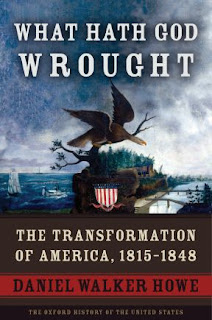What Hath God Wrought
 I just finished reading a fascinating book called What Hath God Wrought: The Transformation of America, 1815-1848, by Daniel Walker Howe. It is part of the Oxford History of the United States, and won a Pulitzer Prize. It is a long book--over 800 pages--but almost always interesting to read, particularly to a history buff as much as myself.
I just finished reading a fascinating book called What Hath God Wrought: The Transformation of America, 1815-1848, by Daniel Walker Howe. It is part of the Oxford History of the United States, and won a Pulitzer Prize. It is a long book--over 800 pages--but almost always interesting to read, particularly to a history buff as much as myself.The book's greatest success is that it manages to be comprehensive. It covers all aspects of American society. Of course there's the politics, presidential and otherwise. We get the lowdown on all the presidential elections that occur in the time period. But there's so much more, particularly on the social history of the American people, from religion to literature (it was a particularly ripe time for American literature--an "American Renaissance"). There's also details about the technological breakthroughs of the period, mostly in the areas of transportation, such as the digging of the Erie Canal and the development of the railroad, and communication, which is where the title comes from (it was the first message transmitted by Samuel F.B. Morse's telegraph, which revolutionized the world).
Howe writes in a narrative style, so there are several characters, perhaps none so large as Andrew Jackson. The book starts with the Battle of New Orleans, which Jackson won as a general, the last conflict of the War of 1812 (which was fought two weeks after the war was settled by treaty, an example of how keenly something like a telegraph was necessary). Jackson would dominate the era, and many call it the Age of Jackson. He was a candidate for president in 1824, but lost even though he had the highest popular vote total, but was then elected to two consecutive terms in 1832 and 1836. He would change the role of presidents, and would make his mark in a number of areas, most particular the destruction of the Second Bank of the United States, Indian removal (which led to the shameful "Trail of Tears") and heroically against nullification, which was an attempt by South Carolina to secede. I think Jackson's personality can be summed up in this passage:
"To deter the nullifiers from attacking the Unionists in their midst, Jackson warned a South Carolina congressman that 'if one drop of blood be shed there in defiance of the laws of the United States, I will hang the first man of them I can get my hands on to the first tree I can find.' When Robert Hayne ventured, 'I don't believe he would really hang anybody, do you?' Thomas Hart Benton replied, 'I tell you, Hayne, when Jackson begins to talk about hanging, they can begin to look for ropes!'"
In contrast with Jackson, who was lax in following the laws of the land (the Supreme Court ruled against Indian removal, but Jackson famously said, "They have made their decision, now let them enforce it"), there was John Quincy Adams, sixth President of the United States and a constant thorn in Jackson's side. Howe dedicates the book to him, and the fondness comes through. Adams, in the light of current opinion, comes across as a "good guy." Not only was he an effective Secretary of State, gaining the territory of Florida, but he was on the right side of many of the issues of the day, such as slavery, Indian removal, and the war/land-grab against Mexico. He collapsed and died while in the chamber of Congress, where he served after being President.
Another prominent character is Henry Clay, who was never president, but not for lack of trying. He was a candidate several times, and is best known for saying "I would rather be right than be President." All presidential elections are key moments in American history, but perhaps none so much as the one in 1844, which Clay lost to James Knox Polk, who was firmly for slavery and was an imperialist who warred against Mexico to secure California and New Mexico (and also gained the Oregon territory and Texas--the country grew more under Polk than any president). Howe notes that "some historians have carefully examined the likely consequences of a Clay victory in 1844 and concluded that it would have probably have avoided the Civil War of the 1860s. We too readily assume the inevitability of everything that has happened. The decisions that electorates and politicians make have real consequences."
There is a lot more here, some of it familiar, like the Alamo, the Mormon migration to Utah, the Amistad case, and the Transcendentalists, and people such as Eli Whitney, Nat Turner, a young Abraham Lincoln, and Elizabeth Cady Stanton. She was one of the principals of the women's rights conference in Seneca Falls, New York in 1848, which Howe uses to end the book. He writes, "American history between 1815 and 1848 certainly had its dark side: poverty, demagogy, disregard for legal restraints, the perpetuation and expansion of slavery, the dispossession of the Native Americans, and the waging of aggressive war against Mexico. But among its hopeful aspects, none was more encouraging that the gathering of the women at the prosperous canal town of Seneca Falls."
This is a fascinating period of American history, and is overlooked somewhat in comparison to the Civil War years. But there have been a lot of books lately about it and about Jackson. It's hard to imagine a better book about the period that this one.


Comments
Post a Comment